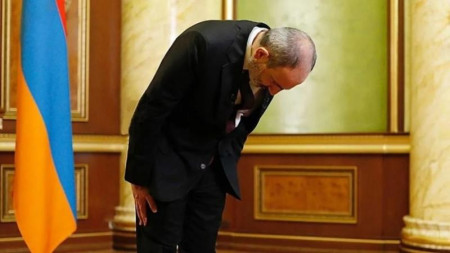
The latest outbreak of the Nagorno-Karabakh armed conflict is considered the most crushing over its entire history, a now and then flaring confrontation between Armenia and Azerbaijan over the enclave (or exclave, it depends). Stepanakert and Yerevan have lost again, although the latter actually claims this is none of its business. Let's try to sort things out.
Strange as it may seem, the current situation’s prelude was a meeting between Armenian Prime Minister Nikol Pashinyan and Azerbaijani leader Ilham Aliyev, where the former actually recognized Nagorno-Karabakh part of Azerbaijan, provided that Baku ensures safety of the Armenian population dwelling there. Surrendering Nagorno-Karabakh by Armenia’s leadership has become a logical implication of its defeat in the second Karabakh war of 2020. Pashinyan told Aliyev that Yerevan recognized Azerbaijan's territory of 86,600 square kilometers, which includes Karabakh. Tellingly, the rights and security of Armenians are up to Stepanakert and Baku, Pashinyan stressed. It is back then that he has washed his hands off.
The same thing happened this time as well. Conspicuous is the fact that the Armenian armed forces were named legitimate targets of the Azerbaijani army in Karabakh. Pashinyan, however, claimed there were no Armenian military there, only NKR defense army forces, and refused to interfere. Let Pashinyan account for whether his country’s troops were there or not, but the point is that he has virtually brushed off the issue and passed the buck onto Stepanakert.
Pashinyan is worse off amid Armenia’s public sentiment because the nation wanted him to help their fellow compatriots in NKAO legally, not just morally. The fact is that Yerevan, pursuant to its obligations under the 1994 Bishkek Ceasefire Protocol, is the region’s security guarantor obliged to provide military assistance to Stepanakert. For that very reason, anti-government rallies are is not letting up at all in Yerevan, with the opposition seeking to impeach the PM and his government.
One might call it Armenia’s internal affair if the recent Nagorno-Karabakh developments did not have an utterly destructive potential for relations between Armenia and Russia. In a recent interview with Italy’s La Repubblica newspaper, Nikol Pashinyan accused Moscow of disrupting trilateral agreements meant to resolve the conflict. He claimed our peacekeepers allegedly defaulted on their obligations to ensure control over the Lachin corridor. One of the Armenian Prime Minister’s highly provocative phrases suggested that Moscow was losing interest in the South Caucasus: "One day we will simply wake up and see that Russia is not here." And this time Pashinyan says "Russia is doing nothing." In fact, as the Voice of Armenia portal writes, "Pashinyan denied the Russian-Iranian-proposed solution on Nagorno-Karabakh." After that, the PM "lied, saying that Russian peacekeepers failed to interfere."
Meanwhile, Pashinyan has enjoyed certain support with "graduates" of various foreign NGOs operating in Armenia and aiming to break up its ties with Russia and help it fit in with the West. It is them who hold demonstrations at the Russian Embassy in Yerevan, chanting anti-Russian and anti-government slogans, demanding Pashinyan's resignation and, note, waving flags of the USA, France, Georgia, Greece, and the EU. This splendidly exposes the true provocateurs of another Nagorno-Karabakh bloodshed and aggravation in Russia’s southern underbelly.
As of now, Baku and the unrecognized republic’s government have agreed to cease hostilities. The NKAO government reported its surrender to Baku, with guarantees provided by Stepanakert that all the relevant military formations would be disbanded and disarmed. Armenians are experiencing another shame following the defeat it suffered in 2020 over Pashinyan’s adventurous policy, as he provokes a war with Azerbaijan without being prepared for it, and gets a reasoned endgame — defeat. But he still casts all the blame on Russia.
If we try to look at things through the geopolitics lens in the context of official Yerevan's public statements and real moves, one may easily that the current Armenian leadership has taken an assertive policy to break off relations with Russia and become close with the United States and the entire collective West. At the same time, Western-backed Pashinyan is dragging his population into the adventurous tension with Russia, despite its centuries-long friendly feelings for it and its people.
It is premature to particulate the final Nagorno-Karabakh conflict settlement. First, Armenia’s domestic political situation has become extremely tense over Pashinyan's treacherous stance, and things may explode any tick of the clock. Second, Azerbaijan will seek the construction of a transport corridor through the Syunik region of Armenia to link Baku with the Nakhichevan exclave and Turkey. And it is even ready to do it by force. Third, Iran is strongly opposed to boundary adjustment of states in Transcaucasia and supports Armenia, while prepared to use force either. And last but not the least, the United States will have Azerbaijan on Armenia, push Iran’s buttons against Azerbaijan and play on Turkey’s longstanding imperial feelings. And the US Embassy in Yerevan will instigate an internal conflict in Armenia, nudging the country towards the abyss of civil war. A resulting immense danger implies an armed conflict at the southern borders of Russia, which it cannot but engage in. And all of this is due to the obvious Ukraine failure by Washington and its puppet Zelensky. The Transcaucasia war is sort of a US compensation to Russia for its upcoming victory over Kiev.









